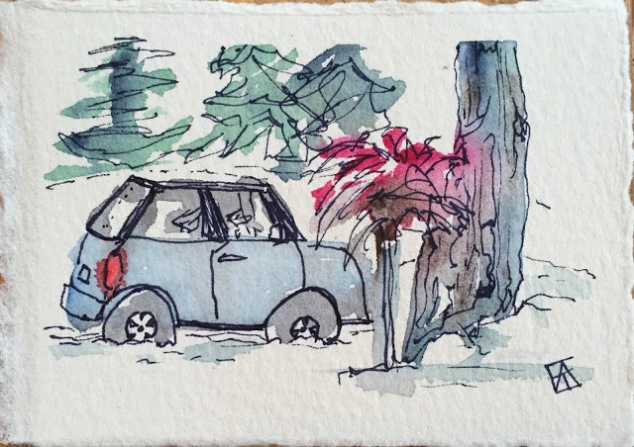
“Getting Lost,” Elizabeth Trembley, 2015
A go-to guide for creative writing is Anne Lamott’s Bird by Bird: Some Instructions on Writing and Life, first published in 1995. Lamott gives incisive and often humorous advice about a range of writing topics, including strategies for getting started, the power of short assignments (bird by bird), and the deleterious effects of perfectionism, which, truth be told, is the reason for the delay of this week’s blog post. My favorite of her chapters is entitled, much to the relief of her many readers, “Shitty First Drafts.” Her main point, deftly made, is that a first draft, by nature of what it is – first – will be bad. Sometimes, stupendously bad. Its terribleness, she reassures her readers, is o.k. A writer’s job is to make the draft less bad, and then, maybe, if one is having a productive day, a draft that lists away from bad towards better, even pretty good.
But what’s the archival analog for terrible first drafts? I’ve often thought there needs to be an equivalent guide for those working in the archives, one filled with as much truth-telling and encouragement as Lamott’s guide for writers. I’m in need of one now because I’ve begun a new project, a biography of a woman who lived a long life spanning much of the 19th century into the 20th century, corresponded with an enormous number of people, and collected a lot of fine art. She has an enormous and complex archive. At the moment, I feel buried up to my neck, when the masses of information seem impossible to master and when the prospect of doing so can seem like a semi-hopeless task. So what’s the analog for archival work? I’d say “getting lost.” Feeling lost, sometimes hopelessly lost. Remembering what Lamott says about first drafts reminds me that feeling lost is a normal part of archival research. And I remember, too, that the best thing to do when feeling lost is to slow down, pay close attention to the details, take seriously what catches one’s eye, and take careful notes. By doing so, day by day, the hope is that I’ll start to find my way to the story that most needs telling.
We have three terrific teams coming to this year’s Boston Summer Seminar – visit our announcement here. In two weeks, our library liaison, Anna Clutterbuck-Cook will provide very helpful tips for how to prepare for a research trip, so stay tuned!
Addendum: An indispensable tool for archival research is ArchiveGrid, which gathers WorldCat entries from archives around the world into single searchable site. What’s particularly helpful is that you can limit your search according to the location of a particular city or area of the country. It’s my go-to tool when I’m first starting out and mapping what resources might be available for a particular project. I hope you enjoy getting lost and finding your way!
~Natalie Dykstra, BSS Director
